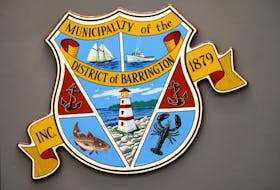NOVA SCOTIA - Food security amid global tumult and turbulence is a big concern for Nova Scotia’s agriculture minister, but Keith Colwell still believes Nova Scotians can feed themselves.
“The major thing we just started talking about a few months ago is food security,” Colwell said in an interview. “And when I say food security, I mean food supply security to make sure we can feed ourselves and the province. We want to be able to get self sufficient as quickly as we can because, with the turmoil in the world and everything that’s going on all over the world, we have to make sure we can get a sustainable food supply for our residents.”
He points to UN-predicted world food shortages.
“We’re not going to be able to feed the world based on the rapid population growth, mainly in Asia and India, and other parts of the world as well,” Colwell said. “There’s just not going to be enough food to feed everybody. So it’s important that we grow enough food not only to feed everybody in the province … which we can do with some adjustments to what we do, but also we can take those products and we can export them to markets all over the world and really improve our economy.”
Colwell said there are about 2,600 registered farms in the province. “And some farms aren’t registered with us. It’s not necessary to be registered, so there would be more than that. It has very huge economic benefits to the province (and) agriculture in general,” he said.
‘Excited about agriculture’
While the future calls for increased self-sufficiency, Colwell said Nova Scotia farmers are already doing an amazing job both in supply-managed sectors like dairy and poultry, but also in less regulated sectors like grapes, beef, blueberries, and sheep.
“We’re very excited about agriculture, the wine industry in particular,” he said. “They employ right around 934 people right now, which is a significant improvement, and every bottle of Nova Scotia wine – studies have been done independent of our own wine people – puts $36.62 into our economy… every bottle of Nova Scotia wine sold that’s made from Nova Scotia grapes.”
He said it doesn’t matter what the price of the wine is, that figure takes in factors like the construction of the winery, operating the winery, the vineyard operation, the maintenance and tourism.
“It’s a significant economic impact, probably one of the biggest ones we have in the province - direct ones. We’re just scratching the surface, just barely scratching the surface. In the wine region we’re just an infant in the whole system and we have a long way to go.”
He described Nova Scotia as emerging wine region.
“Wineries are establishing wines like Tidal Bay, which by the way is an appellation wine,” he said in reference to the standards to which the wine is held to – such as the grapes used and how it is made. “I believe it’s the only one in Atlantic Canada and one of a very few in Canada. That’s quite an accomplishment for a small industry like we have.”
Sparkling reputation
The minister said that Nova Scotia is emerging with an excellent reputation for wines.
“Actually Gordon Ramsay’s restaurant in London serves a product from Benjamin Bridge (Gaspereau Valley) on the menu. That’s one of the top restaurants in the world,” Colwell said. “Lightfoots (Lightfoot and Wolfville Vineyard) this past year sold out three or four of their brands between two and four weeks of when they opened. They’ve sold out some of their brands totally. They’re winning awards all over the world.”
The minister recalls top sommeliers from all over the world being in Toronto.
“I believe 36 of 39 of them came here and they just could not believe the quality of our wine and our products.”
Grapes may be the new poster child for Nova Scotia agriculture, but there’s growth and interest in other areas.
“Beef has a resurgence of interest now and there’s a lot of positive things happening there,” Colwell said. “We have a lot of new niche products coming on to the market. Products that we didn’t grow before.”
He said there’s plenty of room for niche market farming in Nova Scotia.
“We put a new program in place where all farms can grow to whatever size they want to be,” he said.
The province helps with business plans, putting together programs, and helping to expand in areas they need to expand so they can get their sales up and their profits up.
“It’s a really, really good program,” Colwell said. “That’s to sort of help that niche marketing and people who want to start small and grow into a good size business if that’s what they want to do. Or stay small and have a lifestyle and make themselves a good living with their families. Farming is a lifestyle - a very good one.”
Agricultural opportunities abound
A major farming milestone in Nova Scotia came in 2015 when NorthumberLamb (Northumberland Lamb Marketing Co-operative) in Bible Hill became a federal plant meeting CFIA stands.
“We really worked very closely with NorthumberLamb to get them CFI approved, and now that they are and we can ship the products out of the province,” said Colwell. “And one of the main ones was Sobeys. They had their central warehouse in Moncton so we couldn’t even ship to Moncton before, so you had to send the live animals outside the province to get them processed. But now we can process it at NorthumberLamb.”
“We worked with them about a year after I became minister and it took about a year to get them up to CFIA standard,” Colwell said. “We worked with them closely and now they are and that means as much as they can produce through the processing facility for export markets, plus the local market. We really want to see that industry grow.”
It’s a good business, too, because it doesn’t take a lot of up-front capital to get into it. And there are a lot of products that you can get from lamb and it’s a good place for young people to start because it’s not like a beef farm, where the cattle are so expensive and it costs so much to get into it. We’re strongly supporting that industry.”
There are other agricultural opportunities in Nova Scotia as well, like sweet potatoes.
“I think we could get the crop 10 times bigger than it is and still not satisfy just our local market,” the minister said. “Sweet potatoes are getting more and more popular, more and more people like them.”
And while Nova Scotia produces some of the best strawberries in the world, there’s another aspect to that commodity few know about.
“One thing that we’re known for in the province and nobody talks about is the strawberry plants themselves,” he said. “We send them to Florida, we send them all over North America.”
He pointed to C.O Keddy Nursery Inc. in Lakeville, Kings County as being possibly the largest supplier of strawberry plants in North America.
Farming careers
The minister believes that Nova Scotia’s road to food self sufficiency lies in part with young people and making farming a career choice.
“It’s the big thing we’re looking at, and we’re talking about this substantially in our department, and with the federation, and other people” Colwell said. “The thing we have to start talking about in the schools and every place we can, is agriculture as a real career today. It’s high-tech business, it has lots of avenues to make a very good living, an extremely good living, and a lifestyle that you couldn’t get anywhere else in the world.”
He said the guidance councilors at the schools want to push everybody into university.
“University is good if you’re going to agricultural college …but you really don’t have to have a university degree to become a farmer,” she said. “You have to have good business sense, it’s hard work, and you must be willing to learn. The university degree helps you.”
Colwell said farming is not viewed as a career option. “That’s unfortunate because some of these farms are very well off, let’s put it that way. They make very, very good income,” he said. “They have great potential to do things, travel all over the world now marketing their products – everything you can do with any kind of business in the province.”
Unused farmland
Also part of the self-sufficiency equation is unused farmland in Nova Scotia.
“Again, it’s a business decision someone would have to make, and I would suggest to anybody out there who might have south facing land in the Valley they should seriously look at it for a vineyard,” Colwell said. “Vineyards are going to be around for a long time. Some of these vineyards are going to last for hundreds and hundreds of years. It’s a good investment. And, as I said, we have to get to a sustainable food supply for the world, and we can be a small part in supplying that and looking after ourselves as well.”
He believes much of that farmland will be used again.
“That land will be back in production,” he said. “It’s just a matter of when there’s a business opportunity for farmers to realize ‘yes, I’m going to put it back into production.’ We really, strongly should support that.”
Valley a ‘very unique place’
“The Valley is a very unique place, and Nova Scotia as a whole is a very unique place for agriculture,” Colwell said. “When you look at the apple industry and the honey crisp apple, I believe last year they were selling them in Florida for $6.99 a pound and they couldn’t get enough of them. And beside them … from Washington State that are organically grown and they get a dollar, two dollars less a pound than ours, so we have some very unique soil conditions, weather conditions, and extremely good farmers that really produce some top-quality products that we can market internationally.”
Colwell was born on a farm that was in continual production going back to the early 1700s.
“What a wonderful way to make a living farming is,” he said. “It’s so great, and how well we do it in Nova Scotia. There are some things that we do in Nova Scotia the rest of the country envies. Even though we’re small compared to the big producers in Saskatchewan and Manitoba and Alberta, we do things here that they just can’t do.”
And the farmers themselves?
“Nova Scotians that decide they want to go to work have a really good work ethic, and that’s why so many of them are out west because they would hire them on the spot if they were from Nova Scotia,” he said. “Thank goodness a lot of them are coming home again.”
Read the entire BACK ON THE FARM SERIES: A collection devoted to a vital industry in the Annapolis Valley:
- Centre Burlington man discovers passion for oldfashioned farming
- Falmouth farmers shift focus to find the right balance
- Eating healthy on a budget not as difficult in the Valley as one may think: dietitian
- Reporter spends a day at TapRoot Farms in Port Williams
- Diversification key to success for Wolfville farmer who took on grape growing, established winery
- Lawrencetown greenhouse grower diversified into grapes
- Dempsey Corner Orchards farmer sees longevity in trying new things
- Coldbrook farmer proudly commits to the 24/7 lifestyle
- Woodville apple orchards lose UPick crop to June frost
- Keith Colwell pushing food security, farming as a career, capitalization of new opportunities
- Acadia University scholars share their thoughts on sustainability in farming
- COLUMN: Tractors, train changed county farming forever









